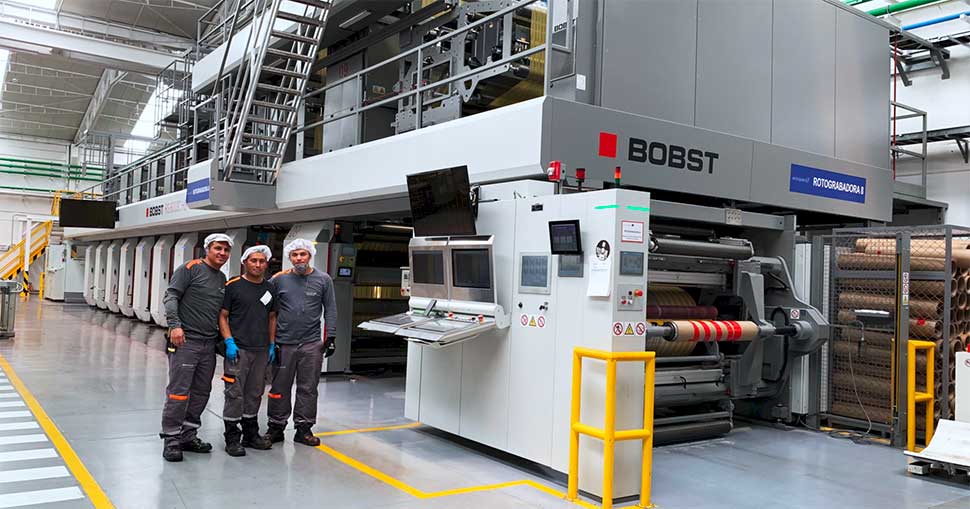Founded in 1976, Minipak S.A.S. is one of the largest flexible materials manufacturers in Colombia, servicing the whole Americas with high quality flexible packaging.
Minipak has seen significant growth over the years and currently has a turnover of more than USD 125 million, thanks to an outstanding investment strategy in its two plants in Colombia. There has also been a strong focus on ensuring its 800 employees have the best skillset to provide customers with the highest performing solutions.
Minipak began by providing the confectionery industry with high quality printed films. Since it was established, customers’ needs and challenges have always been front of mind to create a growth strategy that now places Minipak as a leading player in the market. Over the years, the company’s approach and investments have enabled them to enter new markets, including chocolates, snacks, food, pet food, personal care, and even industrial applications, with more sophisticated products.
“The investment level, which represents up to 15% of Minipak’s turnover, is targeted towards state-of-the-art equipment, the best technology available and reliable technical services to deliver an operation that is efficient and competitive,” says Humberto Portilla, vice-president of production of Minipak. Continued investment has also enabled the business to broaden its geographic reach – today, it exports more than 70% of what it produces to more than 35 countries around the globe.
As a company that strives for quality, it is no surprise that Minipak has a long history with BOBST gravure technology. It first established a relationship with Cerutti, which was acquired by BOBST in 2021, and then continued to invest its technology. Currently, the company counts 7 BOBST gravure presses among its assets and is about to install a brand new one.
Besides purchasing best-in-class equipment, Minipak also invests in maintaining its assets to ensure optimum performance at all times. Recently, the company invested in a Retrofit program to its 10-colour, inline lamination, BOBST RS 6003 HS gravure press. The result was an increase in output of 20% working at speeds up to 600 m/min, greater automation and protection against unplanned downtime of the machine. “Being able to convert cold seal applications at the maximum speed of conventional materials was a must for us, and the collaboration of BOBST and the Minipak team made it possible!” says Humberto.
However, the increase in capacity was not enough to meet the increase in demand, which led the company to consider investing in more capacity. The natural decision was to purchase a new 9-colour BOBST MASTER RS 6003 gravure press.
“Two main reasons explain our decision for BOBST machinery: Number one is the brand itself. BOBST brand resonates among the main large corporations as the ultimate technology in the industry, so when they are evaluating suppliers like us for their packaged goods, the BOBST brand on the equipment nameplate is a plus. Second, from an internal perspective, is the reliability of the equipment and the repeatability of printing, which guarantees we deliver consistent quality time and again to our customers,” says Portilla.
The recent investments not only support Minipak’s geographical expansion, but also provides the company with the quality and performance needed to deliver more products, especially cold seal applications, to customers.
“Improving our capacity with a higher degree of technology, has been key for us to gain significant new businesses worldwide, mainly in more sophisticated products. The move towards cold-seal applications is a good example of that. We recently closed a deal with a leading global chocolate producer, which was only possible due to this capability,” states the executive, mentioning some key differentiators as the colour consistency achieved by colour registration features, and tension control provided by the servo systems, which enables working on thinner and more complex materials.
“There are also significant logistics gains, allowing us to deliver faster. Considering an export to the US, currently our main market, we can deliver in five to six weeks. In some cases, we were able to deliver in less than two weeks!” he says. This is especially important in a moment when companies are witnessing high pressure on the cost of working capital and interest rates.
Quality, sophistication and logistics gains are not the only advantages Minipak achieves. All these gains also translate into a more sustainable operation, as you can achieve more with the same resources. “This is especially important considering we are servicing large global brands all over the world,” states Portilla.
“A well-established process, and relying on equipment that we can run faster, with the highest degree of quality and accuracy, saving us a lot of time and resources, ultimately translates into less waste, lower energy consumption, and resource optimization, making Minipak the supplier of choice when it comes to sustainability.”
Technology and processes are run by people, and that’s an additional strength of the company. Through the ‘Campus Project’, an educational program created by Minipak for their employees, currently 250 people are studying towards a college degree, in areas including engineering, finance and logistics. The goal is to have all employees graduate in about five years. “We are talking about industrial, mechanical, and chemical engineers, for instance. We want to service the market in the most proficient and skilled way.”
“I think that all those things, having the right people, the right equipment, the right technology, pumping in a lot of capital into R&D and having very competitive structure in terms of cost and lead times make us very optimistic about the future ahead of us,” concludes Humberto Portilla.




